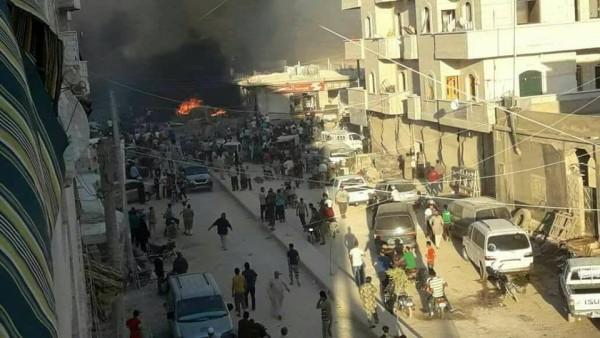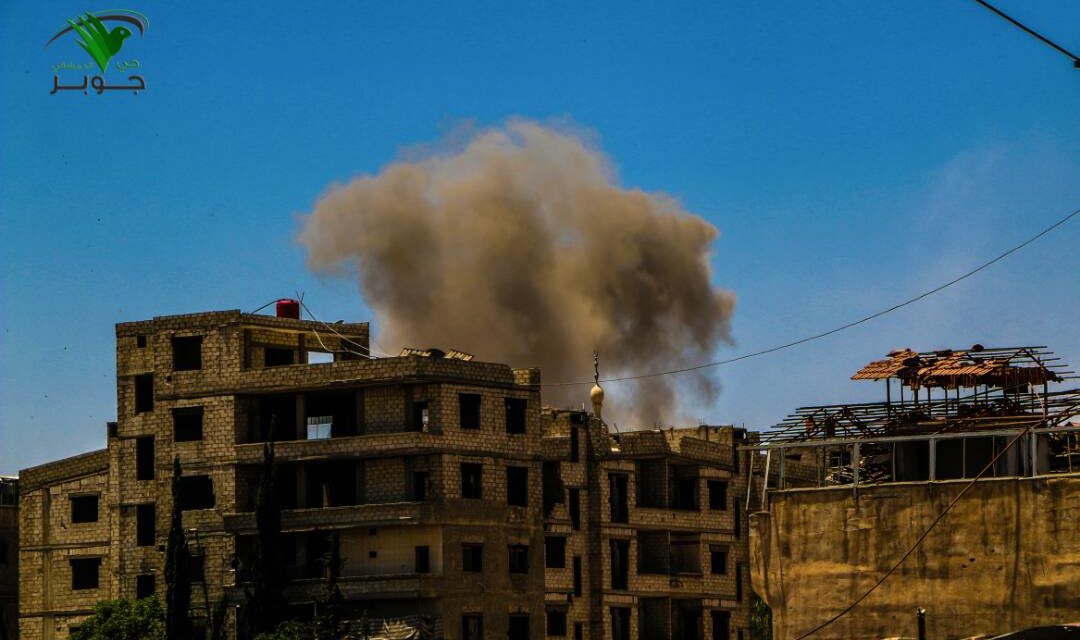Rebel faction says chlorine used since Thursday, but pro-Assad offensive in Jobar repelled
LATEST
- Car Bomb in Idlib Province Causes “Many” Casualties
- Israel Kills 2 Regime Soldiers in Retaliatory Airstrikes
- Trump Administration’s Back Channel with Assad Regime Over Kidnapped American Austin Tice
- Turkey: We Will Retaliate Against Attacks by Kurdish Militia YPG
Rebels claim that the Assad regime’s military has used chemical weapons in an offensive trying to regain territory in the Jobar district in the northeast of Syria’s capital Damascus.
The rebel faction Failaq al-Rahman has said since Thursday that the pro-Assad forces resorted to chlorine in attacks which have been repelled so far in Jobar, divided since 2012 and reduced to rubble by years of fighting and airstrikes.
E. #Damascus: Faylaq Al-Rahman claims Regime launched a chlorine attack on #Jobar after pro-Assad failed to advance today. pic.twitter.com/MUgLCVNEMj
— Qalaat Al Mudiq (@QalaatAlMudiq) June 22, 2017
If true, the chemical attacks would be the first since the Assad regime used a nerve agent, such as sarin, on Khan Sheikhoun in Idlib Province in northwest Syria on April 4. At least 93 people were killed and almost 600 wounded.
The US responded days later with its first missile strikes on a regime site, attacking the airbase from which the attack was launched.
Failaq al-Rahman maintained that, although there was “suffocation” among rebels in Jobar, “Opposition fighters were able to foil any attempts by Assad terrorists and the Shiite militias at occupying any new areas.”
The Assad forces are in the second week of their latest assault. The regime and its allies, including Iranian-led militias, are hoping to finally clear Jobar after recently reoccupying Damascus suburbs such as Barzeh and Qaboun in capitulation agreements.
Car Bomb in Idlib Province Causes “Many” Casualties
A car bomb exploded in the town of al-Dana in Idlib Province in northwest Syria on Saturday evening, causing “many” casualties, according to local reports.
One unconfirmed report claims 15 dead, including children, as residents preparing for the Iftar meal breaking the Ramadan fast.

Israel Kills 2 Regime Soldiers in Retaliatory Airstrikes
Israel has killed two Assad regime troops in retaliatory airstrikes.
The Israeli military said it responded after about 10 mortar shells hit the Israeli-occupied Golan Heights on Saturday afternoon. It said the mortars appeared to be errant fire from Syrian factions fighting each other near the border.
The army said it struck two tanks and a post from which the mortars were fired.
In response to over 10 projectiles launched from Syria, IAF aircraft targeted origin of launches & 2 Syrian tanks
— IDF (@IDFSpokesperson) June 24, 2017
Defense Minister Avigdor Lieberman said:
We will respond strongly, resolutely and with level-headedness to any such case. As far as we are concerned the Assad regime is responsible for what occurs in its territory and will continue to suffer the consequences if such events recur.
The Assad regime’s military confirmed several deaths amid fighting with rebels in Quneitra Province. It did not say if Israel had hit military positions.
Trump Administration’s Back Channel with Assad Regime Over Kidnapped American Austin Tice
The Trump Administration set up a back channel with the Assad regime to pursue the release of Austin Tice, an American journalist and former Marine officer believed to be held by the regime since August 2012.
In early February, CIA Director Mike Pompeo spoke by phone with Ali Mamlouk, the head of the regime’s security services, despite the US sanctions on Mamlouk over human rights abuses.
The conversation was followed by further discussions, but the effort came to nothing after the regime’s nerve gas attack on Khan Sheikhoun in northwest Syria on April 4, according to “several former US officials”.
The Assad regime has denied any involvement in Tice’s disappearance. “Austin Tice is not in the hands of Syrian authorities, and we don’t have any information about him at all,” Deputy Foreign Minister Faisal al-Mikdad said last year.
Turkey: We Will Retaliate Against Attacks by Kurdish Militia YPG
Turkey’s Defense Minister has warned that Ankara will retaliate against any attacks by the Kurdish YPG militia inside Syria.
Turkish-supported rebels have clashed with the YPG over the past week in northern Syria near the Turkish-Syrian border, from Azaz in the northwest corner to Mare’ in northern Aleppo Province. Each side has accused the other of shelling civilian areas.
The prospect of confrontation has risen throughout this year with both groups advancing against the retreating Islamic State. Turkey considers the YPG as part of the Turkish Kurdish insurgency PKK, which has fought Ankara’s security forces for more than 30 years, but the US sees the Kurdish militia as an essential ally in the campaign against ISIS.
Turkish Defense Minister Fikri Isik said Friday, “Any move by the YPG toward Turkey will be answered immediately.”
He implied that Ankara had finally accepted the YPG’s role in the operations to retake the city of Raqqa, ISIS’s central position in Syria, but said, “Threats that might emerge after the Raqqa operation are already being evaluated. We will implement steps that will completely secure the border. It is Turkey’s right to eliminate terror threats across its borders”.
Isik welcomed a letter from US Defense Secretary James Mattis that said US weapons supplied to the YPG, as the leading element in the Syrian Democratic Forces attacking Raqqa, will be returned after ISIS’s defeat. According to Ankara, Mattis also assured that all weapons were being tracked and accounted for.
Isik said Mattis’s statements were a “positive step” but “implementation is essential”.
President Recep Tayyip Erdoğan echoed Isik’s warning to YPG, while declaring in a speech on Friday: “Turkey, with its armed forces and all its capabilities, won’t allow the establishment of a [Kurdish] state in northern Syria. He added:
We told this issue to the US and other countries. We said, ‘Please, never allow such a thing to happen. If you do so, the struggle there would be different and you would be mentioned with terror states.’ We will continue our struggle regarding this issue.

